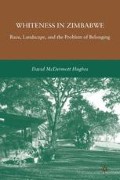Abstract
In choosing to belong ecologically in Africa, mainstream whites undercut the established European justification for appropriating it. That conventional wisdom centered on hard work and improvement. According to John Locke, the frontier farmer “mixed his labour with” the land, enhanced it, and thereby earned rights of tenure. Previous, native occupants had, by contrast, squandered the value of the land and, hence, could no longer lay claim to it. Writing in 1690, Locke referred (erroneously) to the “uncultivated waste of America, left to nature, without any improvement, tillage, or husbandry...” (Locke 1980:19, 24). Meanwhile, English colonists cited exactly his notion of a “civil right” as they appropriated Indian lands in Massachusetts and later west of the Appalachians (Cronon 1983:56; Wallace 1999).1 So-called empty land belonged to no one. Such philosophical and legal codes laid the political basis for expropriation and settlement in much of the extra-European world. Rhodesia’searly land titles insisted upon improvement or “beneficial occupation,” without which settlers could forfeit their land (Palmer 1977:60). The same individuals loved the pristine savannah (or strived to do so) and treated this relationship as the benchmark of integration. Why, then, should they want to transform the landscape, beneficially or otherwise? Pygmalian urges could only signal dissatisfaction and disloyalty. In other words, the logics of territorial ownership and of topographical assimilation — or, in Kosek’s(2006:106) terms, “possession” and “attachment” — worked against one another. Whites could not, at the same time, argue that they belonged to Africa and that Africa belonged to them — unless they could find a substitute for Locke’s notions of improvement and property.
Access this chapter
Tax calculation will be finalised at checkout
Purchases are for personal use only
Preview
Unable to display preview. Download preview PDF.
Copyright information
© 2010 David McDermott Hughes
About this chapter
Cite this chapter
Hughes, D.M. (2010). Owning Lake Kariba. In: Whiteness in Zimbabwe. Palgrave Macmillan, New York. https://doi.org/10.1057/9780230106338_3
Download citation
DOI: https://doi.org/10.1057/9780230106338_3
Publisher Name: Palgrave Macmillan, New York
Print ISBN: 978-0-230-62143-5
Online ISBN: 978-0-230-10633-8
eBook Packages: Palgrave History CollectionHistory (R0)

